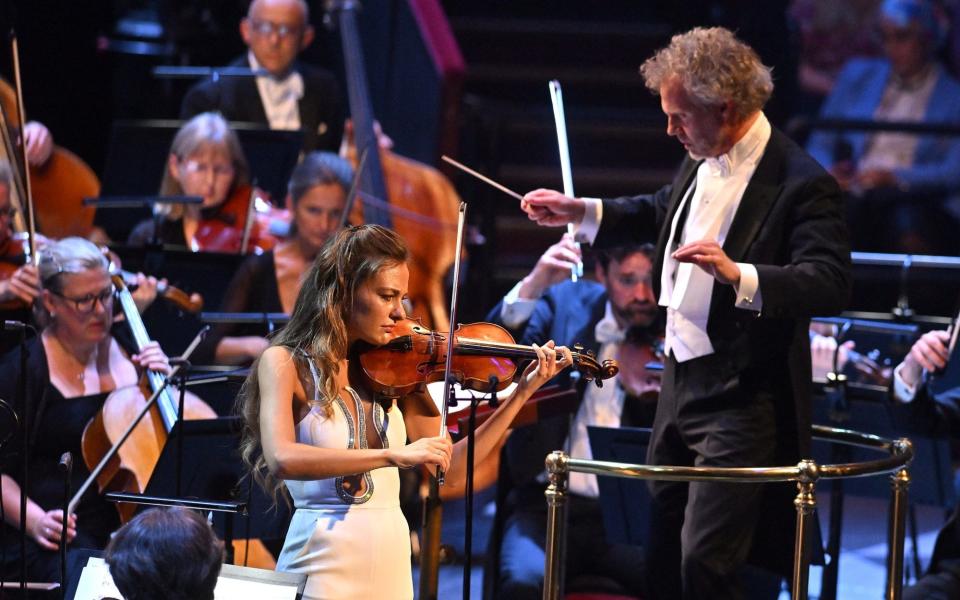best top classical concerts recitals reviews September 2022

Proms, Søndergård/Benedetti, Royal Scottish National Orchestra, Royal Albert Hall ★★★☆☆
Nicola Benedetti's presence at the Proms always guarantees a full Albert Hall, and her fans got full value here in at least one sense: playing the longest violin concerto in her repertoire, she was on stage with the Royal Scottish National Orchestra for 45 minutes. But it felt like a very long 45 minutes, since the duration of Wynton Marsalis's Violin Concerto in D far exceeds its inspiration.
Marsalis's work sets up an expectation it can never fulfil: that "in D" label comes loaded with associations of two of the greatest violin concertos, by Beethoven and Brahms. Maybe it is intended as a joke, but like much else in this distended and fitfully drawn out score it falls flat. Since it was premiered as long ago as 2015 by Benedetti (for whom it was written) and subsequently recorded, the Proms ought to have known better, though perhaps they need to keep onside with the enthusiasms of Benedetti, now director of the Edinburgh Festival.
She certainly poured her heart into this performance, making the most of those few promising ideas Marsalis never really develops. Long, lyrical lines give the opening a suspenseful, storytelling mood, yet the music spreads itself thinly as delicate violin phrases alternate with big-band climaxes. The four movements, likened by the composer to the four corners of the world, sound too much the same: a world as seen from transcontinental airport lounges.
Neither really a rondo nor burlesque, the second 'Rondo Burlesque' movement leads via a seemingly endless cadenza (in dialogue with drum kit) to a 'Blues' movement, which lives more languidly up to its title. In the 'Hootenanny' finale, barn dance meets cèilidh before the soloist eventually leaves the stage, still playing as the music fades.
The rest of this Anglo-American programme was made up of suites drawn from stage works, opening with Thomas Adès's Three-Piece Suite from Powder Her Face, his 1995 opera on the scandal-hit life of Margaret, Duchess of Argyll. Biting and brittle, all three movements are consistent in their heartlessness yet brilliantly orchestrated, and they were conducted with playful precision by Thomas Søndergård, the RSNO's music director recently announced to succeed Osma Vänskä at the Minnesota Orchestra.
Britten's Four Sea Interludes from Peter Grimes got a broad-brush treatment that missed some of their menacing chill, but the Symphonic Dances from Bernstein's West Side Story mixed hijinks with haunting beauty and finally revealed the concert's heart. JA
Hear this Prom for 30 days via the BBC iPlayer. The Proms continue until September 11, all broadcast live on BBC Radio 3 and on the iPlayer. Proms tickets: 020 7070 4441; bbc.co.uk/proms
Proms, BBC SO/Kanellakis, Royal Albert Hall ★★★★☆

Despite its reputation as a bastion of tradition, the Proms is actually super-keen to appear up-to-the-minute. Sometimes, as with the Gaming Prom some weeks back, it simply celebrates a new trend wholeheartedly. At Monday night’s Prom, there was a brand-new piece, bTunes, by Franco-American composer Betsy Jolas, which did something different, registering a new trend while holding it at a critical distance – as you’d expect from a composer who’s just turned 96 and has seen many trends come and go.
bTunes is a wry reflection on “playlist” culture and its horrible tendency to shrink our attention span, cast in the form of bite-sized fragments of piano pieces that Jolas has composed over the years, woven into a dialogue with orchestra. It begins with a moment of comedy, as the orchestral leader Stephen Bryant rose to his feet and reluctantly “conducted” a few throat-clearing cymbal crashes and peremptory plucked notes. Eventually, soloist Nicholas Hodges and conductor Karina Kanellakis stumbled in, miming embarrassment at being late, and took over.
There then followed a quick-fire series of musical-snapshots, none lasting more than about 20 seconds. We heard explosions of Lisztian/modernist heroics brilliantly despatched by Hodges, mock-pompous fanfares, mock-modernist plinks and plunks, and just occasionally a haunting moment of utter stillness. It was amusingly self-deflating and eccentric in the way Erik Satie’s music might have been, if he had lived in the era of postwar modernism. Beneath the restlessness, you could dimly discern the presence of a guiding musical thread, and thanks to that the danger inherent in a piece commenting on the inconsequential nature of playlists – which is that it ends up being inconsequential itself – was just about kept at bay.
On either side of this piece of musical thistledown were two works of reassuring seriousness and solidity. First came Beethoven’s Creatures of Prometheus overture, launched with such explosive force under Kanellakis’s incisive baton I almost jumped out of my seat. After the interval came Mahler’s First Symphony, a piece so overplayed I always wonder how the next performance could possibly make it seem new. But I needn’t have worried. Kanellakis’s conducting reminded us this is a young man’s symphony by giving it a vernal freshness and urgency, and she clearly inspired the players to give their all. This was the BBC Symphony Orchestra’s 11th Prom, but they played with the same fire and delicacy as on the First Night. How do they do it? IH
Hear this Prom for 30 days via the BBC iPlayer. The Proms continue until September 11, all broadcast live on BBC Radio 3 and on the iPlayer. Proms tickets: 020 7070 4441; bbc.co.uk/proms

 Yahoo News
Yahoo News 